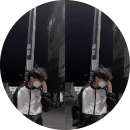VII. Complete the sentences with the verbs in brackets. Use conditional sentences type 1. 1. If the air in a City________ (get) very polluted, it can make people’s eyes burn.
2. If we dump all sorts of Chemicals into rivers, we________ (not be) able to swim in them in the future.
3. Many wildlife habitats will be destroyed if people________ (keep) polluting the environment.
4. If we all use public transport more, we________ (help) reduce air pollution.
5. If we________ (not stop) over-fishing the oceans, many species________ (become) extinct.
6. If everyone________ (recycle) paper, metal and glass, we ________ (not produce) so much rubbish.
7. We________ (have) dirty seafood if we________ (dump) rubbish into the sea.
8. If global warming________ (continue), temperatures________ (rise) even higher.
9. If light pollution________ (keep) growing, you________ (not be) able to see even the Big Dipper at night.
10. We________ (threaten) our own existence if we________ (not cut down) the waste rapidly.
VIII. Complete the sentences with the verbs in brackets. Use conditional sentences type 2.
1. If people________ (not be) so careless, Earth wouldn’t be in danger.
2. The amount of waste ________ (decrease) if people started to buy reusable packages.
3. Many fish wouldn’t die if factories________ (not dump) so many Chemicals into rivers and oceans.
4. If people stopped using cars completely, there________ (be) much less pollution.
5. If people________ (buy) more recycled paper, there wouldn’t be so much waste.
6. If we________ (not bury) Chemical waste underground, we ________ (not pollute) fresh water supplies.
7. Pollution________ (not be) such an issue if governments and common people really ________ (care).
8. What ________ (happen) if the whole world________ (be) full of pollution?
9. If people________ (pay) a little more attention to the environment, the Earth________ (be) greener.
10. If people no longer________ (pollute) the atmosphere, the air________ (soon become) clean again.
ai lam nhanh va dung to se tick











